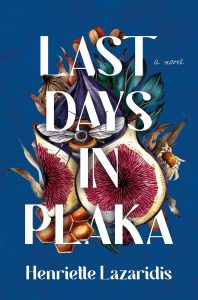Henriette Lazaridis: On Writing LAST DAYS IN PLAKA
 As an athlete, I’m familiar with the principle of different kinds of training intensity, and I’m familiar with the concept of being in the zone. I’m pretty sure I’m mostly a slow-twitch muscle fiber kind of person, doing better at endurance efforts than at sprints. B
As an athlete, I’m familiar with the principle of different kinds of training intensity, and I’m familiar with the concept of being in the zone. I’m pretty sure I’m mostly a slow-twitch muscle fiber kind of person, doing better at endurance efforts than at sprints. B
efore 2020, if you had asked me what kind of writer I am, I’d have probably answered you with a similar reply: the slow-twitch, endurance efforts kind of writer. As for being in the zone as a writer, I don’t believe the notion that the muse visits you and bestows upon you the gift of art. The only creativity zone I’ve experienced has been hard-won–the kind of breathless, hang-on-or-you’ll-lose-the-thread experience that comes only after hours at the desk.
Imagine my surprise, then, when it seemed a muse of some kind did visit me one night in August, 2020, and I was able to draw on fast-twitch writing-muscle fibers to produce the first draft of what became Last Days in Plaka by the end of that November.
I was getting into bed one night that summer when two sentences popped into my head. “This is not her story. She stole it from the young woman who did not realize until the end that it was hers.” I didn’t really give the sentences much thought except to wonder briefly where they’d come from. But when I woke up in the morning, they were still there. “This is not her story–” and the rest, unchanged, remembered despite the mists of sleep.
What came along with those sentences were two characters, almost fully formed that morning: Irini, 82-years old, an old Athenian lady; and the Greek-American Anna, at 26, naive and a bit lost, and exhilarated to be introduced to the older woman by their priest.
Their priest? I’m not a religious person, and, like most Greeks, my family and friends save church attendance for the major holidays and rites of passage. Where, then, had this idea come from that these two very different women would be linked by a priest–that they would regularly attend the little church I knew from real life to be situated in the heart of Plaka, the ancient quarter of Athens (and also the most heavily-touristed one)?
Given that this was happening during August of the pandemic, it didn’t take me long to realize where the elements of what would become my third novel came from. We were all stuck at home. We couldn’t travel. I had last been to Athens in December of 2019, and now I realized it would be two more years at least before I could set foot in Greece again.
The family members I had not gotten to see, the places I had not lingered in in December: they were as good as lost to me, considering I had no clue when I might have another chance. The idea of no next chance hung in my mind then, and stuck itself to this story that had come into my head.
As I began writing, I knew little about my story besides the premise that the two women would form an unlikely friendship once introduced by the priest, and that there would be some sort of theft or fraud to their relationship. After all, they had come into my head along with this concept of usurpation, of someone claiming something that did not belong to them.
More than that, though, as I went on, was this idea of no next chance. During the pandemic, I was keenly aware that time was passing and we weren’t able to use it. Our days were counting down and we were being forced to waste them. Last days. The end of days. Revelation. These images and ideas formed around my story as I wrote my way into it. The priest found another function: he was leading his tiny congregation in a study of last days, a study of the Book of Revelation.
It took me some time before I realized that an important element to the story I seemed to want to tell was the ignorance of the young woman. Anna doesn’t realize it’s her story–that she has a central role in any story–until “the end.” Her character became someone who comes to understanding at some delay, or with some confusion.
And while I empathized with my character Irini, down on her luck but holding onto elegance and culture, it was Anna I sank into, as she looked for ways to connect to her parents’ native culture while they remained in Astoria, wondering why their American-born daughter couldn’t be happy with the American life they had secured for her by immigrating.
As a first-generation Greek-American whose parents emigrated to the States a couple of years before I was born, I have always felt deeply connected to my family in Greece and to the country itself where I spent my summers growing up and spend time every year. I am the visitor who’s taken for a native, the bi-lingual speaker whose other half doesn’t show because I have no accent in either language, the constant observer who cherishes every detail of the culture I spend so much time yearning to return to.
In Last Days in Plaka, I used an omniscient narrator to allow me that role of the observer who can opine on the realities of the culture and on the foibles and the graces of the characters.
My previous two novels unfold in close-third and in first-person narrative. For Last Days, omniscient was the way to go, suiting fast-twitch writing for the four months it took me to generate the first draft. Omniscient allowed for more summary, for a quicker telling to match the pace of my hang-on-before-you-lose-the-dream production.
So, during the summer of 2020 and into the fall, I transported myself to the time and place I couldn’t reach in real life: the Athenian summer of 2018, with characters who are themselves stuck in some way in the baking hot city they can’t afford to leave. They contemplated last days while I pushed forward day after day in my imagination, writing the place I longed for, creating a creative zone I could inhabit.
—
Henriette Lazaridis is the author of three novels. Her debut, The Clover House, was a Boston Globe bestseller and a Target Emerging Authors pick. A lifelong fascination with explorer Robert Falcon Scott led her to write Terra Nova, about two fictional Antarctic explorers in 1910 and the woman who loves them both. The New York Times’ reviewer called it “ingenious.”
Her third novel, LAST DAYS IN PLAKA, is set in Athens and centers on an extraordinary friendship between two women of different generations. It will be published by Pegasus in April 2024.
Henriette earned degrees in English literature from Middlebury College, Oxford University, where she was a Rhodes Scholar, and the University of Pennsylvania. Having taught English at Harvard, she now teaches at GrubStreet in Boston. She was the founding editor of The Drum Literary Magazine and runs the Krouna Writing Workshop in northern Greece. Her essays and articles have been published in Elle, Forge, Narrative Magazine, The New York Times, New England Review, The Millions, and Pangyrus, and earned her a Massachusetts Cultural Council Artists Grant.
An avid athlete, Henriette trains on the Charles River as a competitive rower, and skis, trail runs, or cycles whenever she can. She writes about athletic and creative challenges at The Entropy Hotel on Substack.
Visit her website: www.henriettelazaridis.com
Instagram: @writerhenriette, @entropyhotel
Facebook: @HenrietteLazaridis
LAST DAYS IN PLAKA
 An immersive and multifaceted novel—The Talented Mr. Ripley by way of Elena Ferrante—that explores the lies at the heart of an old woman’s identity and the desperation of a young woman’s struggle to belong.
An immersive and multifaceted novel—The Talented Mr. Ripley by way of Elena Ferrante—that explores the lies at the heart of an old woman’s identity and the desperation of a young woman’s struggle to belong.
Today’s Athens is a city of contradictions and complexity—it is grand and scruffy, ancient and modern, full of strivers, refugees and old-timers—and nowhere more so than the neighborhood of Plaka, where the Parthenon looms overhead and two women grapple with what is right and what is true, and how to live your life when you are running out of time.
Searching for connection to her parents’ heritage, Greek-American Anna works at an Athens gallery by day and makes street art by night. Irini is elderly and widowed, once well-to-do but now dependent on the charity of others. When the local priest brings the two women together, it’s not long before they form an unlikely bond. Anna’s friends can’t understand why she spends so much time with the old woman, yet Anna becomes more and more consumed by Irini’s tales of a glamorous past. As they join the priest’s tiny congregation to study the Book of Revelations in preparation for a pilgrimage to Patmos, Anna sinks deeper into Irini’s stories of an estranged daughter and lost wealth and the earthquake damage to her noble home.
Looking for revelation of her own, and driven by a sense that time is running out, Anna makes a decision that puts her in peril, exposes Irini’s web of lies, and compels Anna to confront the limits of her own forgiveness.
BUY HERE
Category: On Writing
























